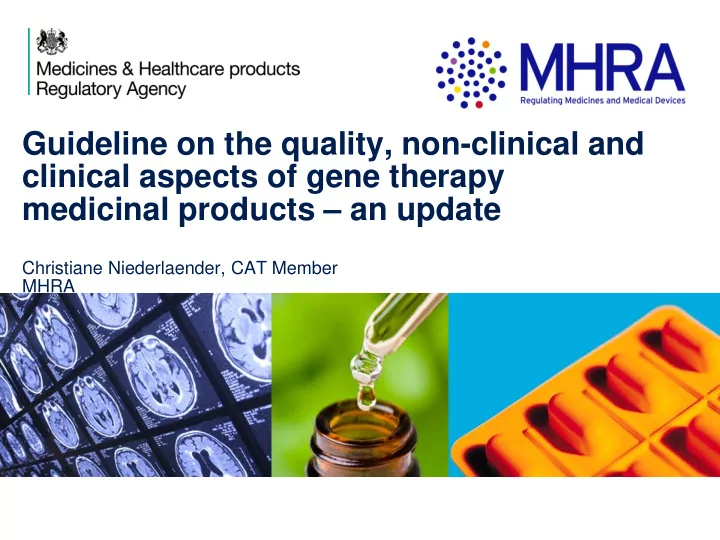

Guideline on the quality, non-clinical and clinical aspects of gene therapy medicinal products – an update Christiane Niederlaender, CAT Member MHRA
Background Current CPMP/BW/3088/99 Nfg on the quality, preclinical and clinical aspects of gene transfer medicinal products (2001) Scope of Revision (Concept Paper, 2010) • to reflect the significant development and experience gained • to consolidate, update and cross-reference available GT guidelines and recommendations • to encompass the requirements related to the introduction of the new legislation (i.e. 1394/2007, amended 2001/83/EC) • to cover development genetics, production, purification, characterisation, quality control and comparability in the quality aspects of gene therapy medicinal products • to provide general considerations as well as specific considerations in quality, non-clinical and clinical aspects of specific classes of gene therapy medicinal products 2
Revised guideline • Cross-competency guideline • Structured in accordance with eCTD • Fewer cross-references to other guidelines • Broad input from regulators and additional experts • Longer - written with requirements of SMEs and academia in mind • Aims to be comprehensive and aims to ensure that correct data are included any MAA in the quality, non-clinical and clinical parts. • Future proofing: field under constant development and guidance should be applicable to any novel product as appropriate Consultation from 20/05/2015 to 31/08/2015 3
Specific points • applicable to all GTMPs, but most information on viral and nucleic acid vectors • Sections aimed at different types of vectors are kept separate • Information on bacterial vectors included but not as extensive • Modified eukaryotic cells are in the main covered by other guidelines • Term ‘therapeutic sequence’ used to reflect diversity of approaches • Quality part with extensive section on development genetics and vector considerations 4
Consultation responses Thank you! ! • Responses received from 28 different stakeholders – across industry spectrum • General comments and specific comments on individual passages of the text • Comments and questions on scope • Quality section the longest = most comments • Specific comments mainly requiring clarification and editorial 5
General Comments • GL aimed at products at the stage of MAA Separate guidance is under development: “Guideline(s) on requirements for documentation for ATMP investigational medicinal products in clinical trials” To be published for consultation 2017 • Clarification about product types covered, status of gene editing technology • Glossary to be added • ERA and GMO requirements out of scope • Further International Harmonisation outside of EU currently out of scope • Lots of requests to describe / identify suitable methods – no change ! 6
Quality • General information Vector design Development genetics • Drug substance • Drug Product • DS and DP: Process development and validation Analytical Method, Validation and Reference Standards Stability Adventitious agents Comments: Definition Drug Substance and Drug Product Vector / Cell line history Sequencing requirements Status of complexing materials Surrogate assays 7
Non-clinical General overhaul of the sections to give a much clearer focus for the requirements • General principles: control groups • Cross reference to the results from quality • animal species/ model selection • Proof of concept studies • Biodistribution • Vector Shedding Comments: Animal models, use of data from homologous models RBA in non-clinical development; use of NC data / experience from same vector with other transgene Expectation for dose finding experiments Timing of NC testing vis-à-vis clinical trials 8
Clinical Section expanded, focus on: • Pharmocokinetic studies: Shedding studies, dissemination, expression products • Pharmacodynamic studies • Clinical safety • Pharmacovigilance Comments: Guidance on methods for long-term follow up Dose finding: dose and dosing schedule justification Removed some repetitious sections 9
Future Timelines: • Drafting group currently finalising amendments in response to consultation comments • Presentations to Working Parties and Committees: early 2017 • Aim for adoption of new Guideline: end of Q1 / 2017 10
Recommend
More recommend